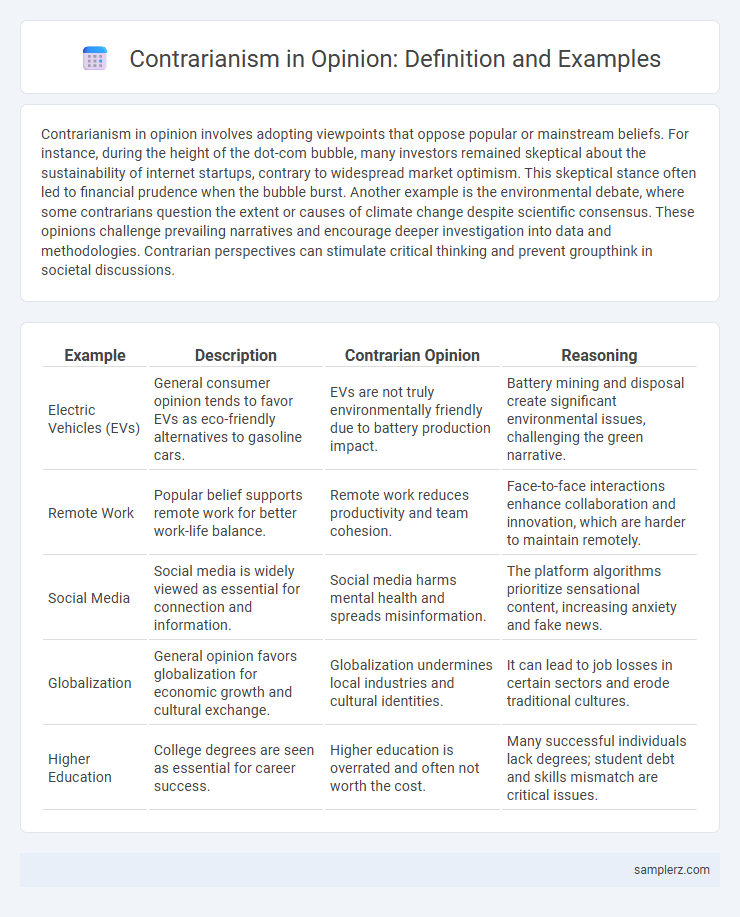Contrarianism in opinion involves adopting viewpoints that oppose popular or mainstream beliefs. For instance, during the height of the dot-com bubble, many investors remained skeptical about the sustainability of internet startups, contrary to widespread market optimism. This skeptical stance often led to financial prudence when the bubble burst. Another example is the environmental debate, where some contrarians question the extent or causes of climate change despite scientific consensus. These opinions challenge prevailing narratives and encourage deeper investigation into data and methodologies. Contrarian perspectives can stimulate critical thinking and prevent groupthink in societal discussions.
Table of Comparison
| Example | Description | Contrarian Opinion | Reasoning |
|---|---|---|---|
| Electric Vehicles (EVs) | General consumer opinion tends to favor EVs as eco-friendly alternatives to gasoline cars. | EVs are not truly environmentally friendly due to battery production impact. | Battery mining and disposal create significant environmental issues, challenging the green narrative. |
| Remote Work | Popular belief supports remote work for better work-life balance. | Remote work reduces productivity and team cohesion. | Face-to-face interactions enhance collaboration and innovation, which are harder to maintain remotely. |
| Social Media | Social media is widely viewed as essential for connection and information. | Social media harms mental health and spreads misinformation. | The platform algorithms prioritize sensational content, increasing anxiety and fake news. |
| Globalization | General opinion favors globalization for economic growth and cultural exchange. | Globalization undermines local industries and cultural identities. | It can lead to job losses in certain sectors and erode traditional cultures. |
| Higher Education | College degrees are seen as essential for career success. | Higher education is overrated and often not worth the cost. | Many successful individuals lack degrees; student debt and skills mismatch are critical issues. |
Challenging the Mainstream: Iconic Examples of Contrarianism
Iconic examples of contrarianism include Galileo Galilei's heliocentric theory that opposed the geocentric consensus, sparking revolutionary change in astronomy. Another notable case is Steve Jobs' vision to prioritize design and user experience in technology, defying the industry's focus on raw computing power. These challenges to mainstream thinking illustrate how contrarian opinions can drive innovation and reshape societal perspectives.
When Going Against the Grain Pays Off
Contrarianism thrives in investing, where defying market trends can yield substantial returns as demonstrated by Warren Buffett's value investing approach. This strategy involves buying undervalued stocks when the majority sell, capitalizing on market overreactions. Historical data from the 2008 financial crisis exemplifies how contrarian investors who bought distressed assets realized significant gains during the recovery.
Historical Contrarians Who Changed Opinions
Historical contrarians like Galileo Galilei challenged the geocentric view by advocating heliocentrism, fundamentally altering scientific consensus. Rosa Parks defied societal norms through civil rights activism, shifting public opinion on racial equality. These figures exemplify how dissenting opinions can drive transformative change in societal beliefs.
Famous Opinions That Defied Popular Belief
Galileo Galilei's endorsement of heliocentrism challenged the geocentric consensus of the 16th century, revolutionizing astronomy despite fierce opposition. Similarly, Susan B. Anthony's advocacy for women's suffrage defied prevailing gender norms and helped reshape American politics. These illustrious examples of contrarianism illustrate how dissenting opinions can catalyze transformative societal change.
The Power of Dissent: Notable Contrarian Perspectives
Notable contrarian perspectives reveal the power of dissent in challenging prevailing norms and sparking innovation across various fields such as science, politics, and culture. Figures like Galileo Galilei, who opposed geocentric views, and economist Friedrich Hayek, who critiqued central planning, exemplify how dissent drives progress by questioning accepted wisdom. These contrarian opinions force societies to re-evaluate beliefs, fostering intellectual growth and dynamic change.
Contrarian Voices: Opinion Leaders Who Broke the Mold
Contrarian voices like Galileo Galilei challenged prevailing scientific views by advocating heliocentrism despite widespread rejection. Opinion leaders such as Rosa Parks defied societal norms, igniting significant civil rights movements through acts of dissent. These figures exemplify how breaking the mold in public discourse catalyzes transformative cultural and intellectual shifts.
From Outcast to Visionary: Celebrated Contrarian Thinkers
Contrarian thinkers such as Galileo Galilei challenged prevailing beliefs by advocating heliocentrism despite widespread opposition, transforming from societal outcasts to visionary pioneers of science. Friedrich Nietzsche's critique of conventional morality initially isolated him but ultimately reshaped modern philosophy with concepts like the Ubermensch. These celebrated contrarian figures embody the power of dissent in fostering groundbreaking ideas that redefine cultural and intellectual paradigms.
Lessons from History’s Most Influential Contrarians
History's most influential contrarians, such as Galileo Galilei and Nikola Tesla, demonstrate the power of challenging prevailing beliefs to drive progress and innovation. Their refusal to conform to mainstream thinking often led to groundbreaking discoveries that reshaped science and technology. Learning from these examples highlights the value of critical thinking and the courage to question conventional wisdom in shaping transformative ideas.
The Value of Unpopular Opinions in Shaping Society
Unpopular opinions challenge prevailing norms and encourage critical thinking, fostering innovation and social progress. Historical examples demonstrate that contrarian views, though initially resisted, often lead to significant cultural and scientific breakthroughs. Embracing diverse perspectives strengthens democratic dialogue and helps society adapt to complex, evolving challenges.
Contrarianism in Action: Stories of Bold Opinion-Makers
Contrarianism in action is exemplified by bold opinion-makers who challenge prevailing narratives, such as Malcolm Gladwell's provocative takes that often overturn conventional wisdom. These individuals leverage unconventional insights and data to provoke critical thinking and foster debate, reshaping public discourse with fresh perspectives. Their willingness to defy consensus underscores the value of contrarianism in driving innovation and social progress.

example of contrarianism in opinion Infographic
 samplerz.com
samplerz.com